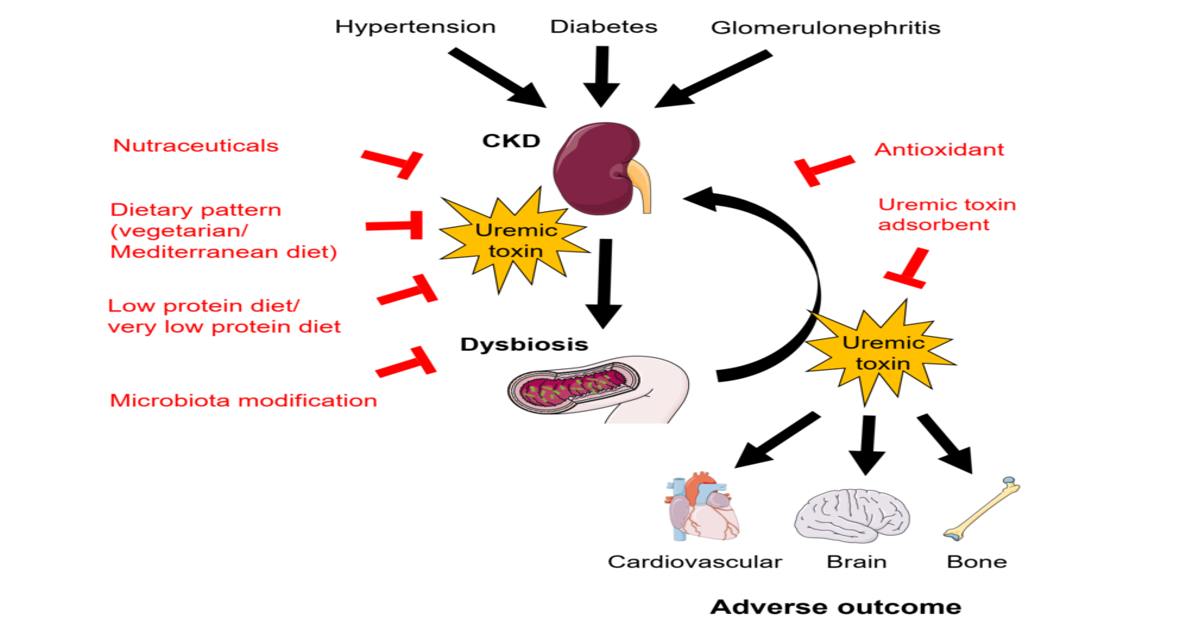- 5.0Impact Factor
- 9.1CiteScore
- 16 daysTime to First Decision
Chronic Kidney Diseases: Multimodal Nutrition Management and Outcomes
This special issue belongs to the section “Nutritional Epidemiology“.
Special Issue Information
Dear Colleagues,
Chronic kidney disease (CKD) is characterized by a progressive decline in glomerular filtration rate or persistent proteinuria for more than 3 months. CKD itself may lead to maladaptive repair and accelerated renal fibrosis by hyperactivity of the sympathetic tone, renin–angiotensin–aldosterone system, deregulation of redox homeostasis and inflammatory response, as well as increased accumulation of gut-derived uremic toxin. These metabolic changes further accelerate glomerular sclerosis and sequential tubulointerstitial fibrosis. The current pharmacologic treatment of CKD is not satisfactory; CKD patients are also suggested for dietary intervention with protein restriction to lessen kidney disease progression. On the other hand, CKD and dialysis patients are associated with a high risk of malnutrition. Keeping a balance between protein restriction and malnutrition is of the utmost importance. Therefore, seeking potential, nutritional interventions for CKD with improvement of the clinical outcome will be needed. To this end, we sincerely invite researchers to contribute their research works to the Special Issue, entitled " Chronic Kidney Diseases: Multimodal Nutrition Management and Outcomes ", which aims to provide a research platform for the collection of original research articles and the latest reviews which cover all aspects of kidney diseases or dialysis.
Dr. Ko-Lin Kuo
Guest Editor
Manuscript Submission Information
Manuscripts should be submitted online at www.mdpi.com by registering and logging in to this website. Once you are registered, click here to go to the submission form. Manuscripts can be submitted until the deadline. All submissions that pass pre-check are peer-reviewed. Accepted papers will be published continuously in the journal (as soon as accepted) and will be listed together on the special issue website. Research articles, review articles as well as short communications are invited. For planned papers, a title and short abstract (about 250 words) can be sent to the Editorial Office for assessment.
Submitted manuscripts should not have been published previously, nor be under consideration for publication elsewhere (except conference proceedings papers). All manuscripts are thoroughly refereed through a single-blind peer-review process. A guide for authors and other relevant information for submission of manuscripts is available on the Instructions for Authors page. Nutrients is an international peer-reviewed open access semimonthly journal published by MDPI.
Please visit the Instructions for Authors page before submitting a manuscript. The Article Processing Charge (APC) for publication in this open access journal is 2900 CHF (Swiss Francs). Submitted papers should be well formatted and use good English. Authors may use MDPI's English editing service prior to publication or during author revisions.
Keywords
- chronic kidney disease
- dietary pattern
- gut–kidney axis
- microbiota
- nutriceuticals
- reactive oxygen species
- renal nutrition
- uremic toxins

Benefits of Publishing in a Special Issue
- Ease of navigation: Grouping papers by topic helps scholars navigate broad scope journals more efficiently.
- Greater discoverability: Special Issues support the reach and impact of scientific research. Articles in Special Issues are more discoverable and cited more frequently.
- Expansion of research network: Special Issues facilitate connections among authors, fostering scientific collaborations.
- External promotion: Articles in Special Issues are often promoted through the journal's social media, increasing their visibility.
- Reprint: MDPI Books provides the opportunity to republish successful Special Issues in book format, both online and in print.


